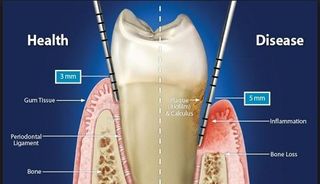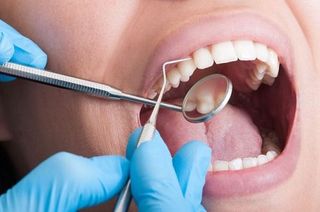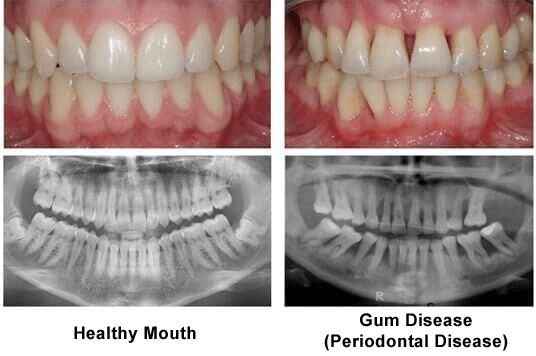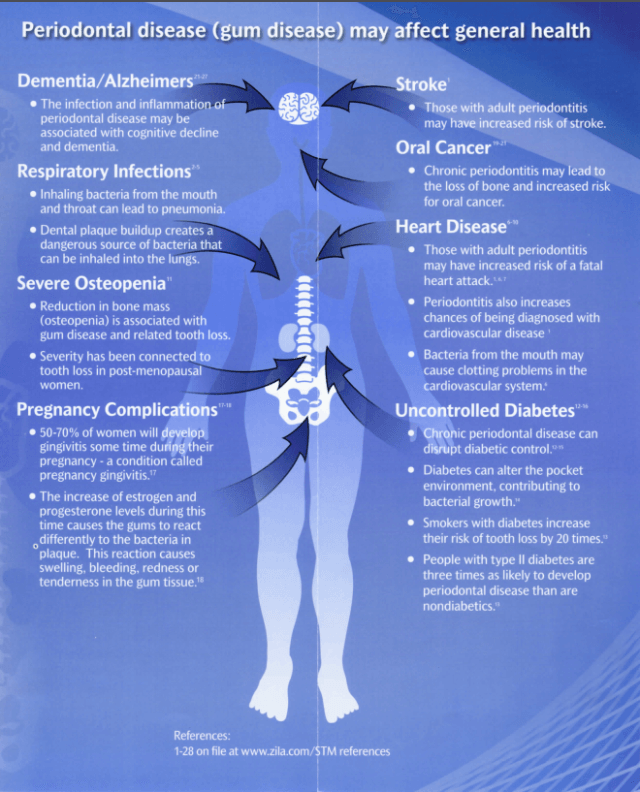TREATMENT FOR DISEASES OF THE GUMS
Periodontal Disease Treatment



What You Should Know About Gum Disease:
Immediately after brushing, billions of bacteria come back and start multiplying. Without proper brushing and flossing, bacteria populate and can lead to gum disease.
Gingivitis
Gum disease is an infection that affects the tissues and bone that support your teeth. The infection is caused by the bacteria in plaque, a sticky film that's always on your teeth. The bacteria in plaque irritate the gums, making them red, tender and prone to bleeding. This condition is called "Gingivitis". If gum disease is caught early enough (when it is Gingivitis) you may simply need a regular cleaning by your dental hygienist. Gingivitis can be reversed if you remove plaque before it builds up. We recommend brushing twice a day, flossing daily and maintaining your regular professional dental cleaning appointments. This is a professional cleaning above the gum line.
Periodontitis
If Gingivitis is not treated, it can turn into "Periodontitis"- an infection in the spaces between your the teeth and gums and around the teeth. In time, as plaque and tartar build up where your teeth and gums meet, plaque bacteria break down the gum tissues and bone around your teeth. Spaces called pockets start to form. As the bacteria reside in the pockets, your gum disease will get worse. If the disease is not treated at this stage, your teeth may become loose and your overall health can deteriorate. You may need a special deep cleaning called scaling and root planing. This is a cleaning below the gum line.
Warning Signs of Gum Disease:
- Gums that bleed when you brush or floss
- Gums that are red, swollen, puffy or tender
- Gums that no longer tightly hug your teeth
- Bad breath that doesn't go away
- Pus between your teeth and gums
- Feeling that your teeth are loose
- Changes in the way your teeth come together when you bite
- Changes in the way your partial dentures fit

Don't Wait Until It Hurts:
You may notice one or more of these warning signs, or you may not notice any at all. That's why it's important to see Dr. Grant for your regular dental checkups to identify Gum Disease (an infection above the gum line) early on so that it can be treated before it progresses to something more serious like Periodontal Disease (an infection below the gum line).
Your Mouth Is A Window Into The Health of Your Body:
Maintaining healthy teeth and gums isn't just about
preventing cavities and bad breath. It is important to your overall health. Why? Because Gum disease or Periodontal disease can erode the foundation of your mouth and could pose a threat to your body. Gum disease is very common with close to 80% of U.S. adults currently having some form of the disease. Other research indicates it is the leading cause of adult tooth loss if left untreated.
What Causes Gum Disease?
- Not brushing and flossing every day
- Dry mouth (saliva washes away bacteria)
- Candy, soda, foods high in sugar
- Tobacco usage in any form
- Changes in the body during pregnancy/birth control pills
- History of Gum disease in your family increases your chances
- Diabetics get more infections like Gum disease
- Medications such as steroids and blood pressure drugs
Interesting Fact:
The bacteria that cause periodontal disease may be passed from parents to children and between partners through saliva. This includes kissing or sharing tooth brushes and eating utensils.
Did You Know Gum Disease Affects Your Overall Health?
If you have gum disease (Periodontal disease) you are more likely to suffer from chronic systemic diseases. The inflammation caused by Periodontal disease and its associated pathogens, endodontic abscesses (infections of the roots of teeth) and cariogenic bacteria (infections/cavities of the crowns of teeth) leads to a higher incidence of chronic systemic diseases. The primary mechanism is arterial tissue damage caused by chronic inflammation.
The great news is that you have the power to treat this infection and help prevent chronic systemic diseases. Some of the chronic diseases associated with Gum disease are:
- Arthritis
- Dementia/Alzheimers
- Uncontrolled Diabetes
- Emphysema/ Respiratory Infections
- Heart Disease/High Blood Pressure/Stroke
- Liver Disease like the Hepatitis C Virus
- Obesity
- Severe Osteopenia
- Oral Cancer
- Pregnancy Complications

How To Treat Gum Disease & Improve Your Overall Health:
(1)
Professional Cleaning or Prophylaxis
In the very early stages- when it is gingivitis- you may just need a
professional cleaning or prophylaxis
from Dr. Grant and her hygienists. This is a cleaning above the gum line. If plaque stays on your teeth, it hardens into tartar (also called calculus). Professional cleanings are the only way to remove tartar, which traps bacteria along the gum line. Dr. Grant and her dental team will give you advice on improving your daily oral hygiene.
(2)
Deep Cleaning or Scaling and Root Planing
If your gum disease is left untreated and progresses to Periodontal Disease- you may need a
special deep cleaning called Scaling and Root Planing. This is a cleaning below the gum line. During your appointment, the dental hygienist will scale or remove plaque and tartar down to the bottom of each pocket. The next step is to clean and smooth your tooth's root surfaces. Smoothing the surfaces helps your gums heal and reattach to the tooth, shrinking the pocket depth. This is the root planing part of the cleaning. This special type of cleaning may require from one to four visits depending on the severity of your Periodontal Disease.
(3)
Periodontal Maintenance Cleanings
Once Periodontal Disease is brought under control with a Deep Cleaning or Scaling and Root Planing, it is very important to maintain your progress and get regular Periodontal Maintenance Cleanings. This type of cleaning is a deeper than normal cleaning. Patients with a history of Periodontal Disease need a deeper cleaning because they have formed "pockets". These periodontal pockets trap plaque and tartar and cause damage to nearby tissues and bone. With regular Periodontal Maintenance Cleanings, the pockets will shrink and the gums become healthier. You will need more frequent cleanings than other patients because your bacteria is located deeper in the tissues. Dr. Grant may recommend a Periodontal Maintenance Cleaning every two to four months.
Studies show that if you follow through with your Periodontal Maintenance Cleanings you are more likely to keep your teeth longer and avoid tooth loss.
(4)
Arestin Medication
You may also need special medications to help control the spread of your periodontal infection and facilitate the healing of your gums. Dr. Grant uses a medication called Arestin. It is an antibiotic that comes in a powder form that is placed locally in your deep pockets. These Arestin microspheres contain the antibiotic drug Minocycline which aids in the killing of bacteria that causes Periodontal Disease. Gum disease won't go away by itself. Because it's an infection, it needs to be treated professionally with an antibiotic in combination with Scaling and Root Planing. The active ingredient Minocycline is released over time into the infected pockets.
This means Arestin medication keeps working to reduce bacteria as your gums heal long after you've left the dental office.
(5)
Periodontal Surgery
Dr. Grant will monitor the healing of your gums following Scaling and Root Planing. If the periodontal pockets have deepened and the supporting bone is lost, more advanced treatment may be necessary. You may be referred to a periodontist. In Advanced Periodontitis, bacteria spread, you lose gum tissue and bone that support teeth. The gums pull farther away and pockets get deeper. Your teeth get loose, shift and can fall out. The periodontist may perform Flap Surgery in which the gums are cut open to remove the infection. Bone grafting may be required to insert artificial bone to replace lost natural bone. If teeth are lost due to the severe progression of periodontal disease, a surgically placed implant may be necessary to replace missing teeth in your jaw.
Dr. Grant will monitor the healing of your gums following Scaling and Root Planing. If the periodontal pockets have deepened and the supporting bone is lost, more advanced treatment may be necessary. You may be referred to a periodontist. In Advanced Periodontitis, bacteria spread, you lose gum tissue and bone that support teeth. The gums pull farther away and pockets get deeper. Your teeth get loose, shift and can fall out. The periodontist may perform Flap Surgery in which the gums are cut open to remove the infection. Bone grafting may be required to insert artificial bone to replace lost natural bone. If teeth are lost due to the severe progression of periodontal disease, a surgically placed implant may be necessary to replace missing teeth in your jaw.
Follow Dr. Grant's Recommendations to Fight Gum Disease and Save Your Teeth For A Lifetime:
- Learn to remove plaque by brushing properly without damaging enamel
- Floss every day to remove plaque and food between your teeth
- Use a prescription oral rinse to aid in the destruction of plaque bacteria
- Use the Sonicare Diamond Clean electric toothbrush to more effectively clean teeth
- Maintain your regular cleaning appointments to remove plaque before it becomes tartar
Avoid Gum Disease by Scheduling an Appointment
Don't wait for things to get worse, to schedule your appointment call
The Hyde Park Center For Aesthetic Dentistry - Christine Grant D.M.D., P.A. in Tampa, Florida today at
813-251-1548.
Contact Information
Phone:
Address:
1407 West Swann Ave, Tampa, FL 33606
Hours Of Operation:
Monday: 7:30 AM - 5:30 PM
Tuesday: 7:30 AM - 5:30 PM
Wednesday: 7:30 AM - 5:30 PM
Thursday: 7:30 AM - 5:30 PM
Friday: Closed
Saturday: Closed
Sunday: Closed









Contact Form
Contact Us
Thank you for contacting us.
We will get back to you as soon as possible
We will get back to you as soon as possible
Oops, there was an error sending your message.
Please try again later
Please try again later
Browse Our Website
Contact Information
Phone:
Address:
1407 West Swann Ave, Tampa, FL 33606
Hours Of Operation:
REVIEW US ON GOOGLE
Monday: 7:30 AM - 5:30 PM
Tuesday: 7:30 AM - 5:30 PM
Wednesday: 7:30 AM - 5:30 PM
Thursday: 7:30 AM - 5:30 PM
Friday: By Appointment Only
Saturday: Closed
Sunday: Closed









Contact Form
Contact Us
Thank you for contacting us.
We will get back to you as soon as possible
We will get back to you as soon as possible
Oops, there was an error sending your message.
Please try again later
Please try again later
Content, including images, displayed on this website is protected by copyright laws. Downloading, republication, retransmission or reproduction of content on this website is strictly prohibited. Terms of Use
| Privacy Policy
